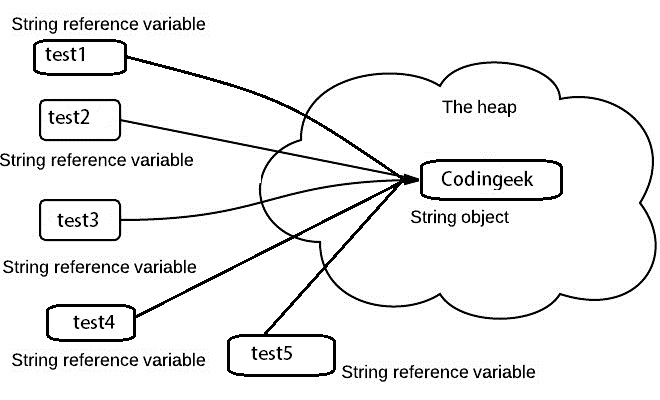Why Are Strings Immutable in Java? Key Reasons and Benefits Described
Why Are Strings Immutable in Java? Key Reasons and Benefits Described
Blog Article
What Is Unalterable Strings and How It Works
In the realm of shows, understanding the principle of immutable strings is critical for developing durable and protected applications. Immutable strings refer to strings that can not be changed after they are created, making sure data integrity and predictability within the code.
The Fundamentals of Immutable Strings
Unalterable strings, as a fundamental idea in programming, are character sequences that can not be altered once they are produced. This suggests that once a string is appointed a worth, that worth can not be modified. In languages like Python and Java, strings are immutable objects, resulting in numerous effects in regards to memory management and information stability.
One of the essential benefits of immutable strings is that they supply a complacency in data control. Considering that the web content of an immutable string can not be changed, it guarantees that the original data remains undamaged, lowering the danger of unintended changes throughout program execution (Why are strings immutable in Java?). This property likewise simplifies debugging procedures, as designers can rely on that when a string is specified, its value will not be unintentionally modified
Additionally, immutable strings assist in effective memory use. When a brand-new string is created based on an existing one, instead than customizing the original string, the new worth is kept separately. This technique enhances efficiency by minimizing memory fragmentation and simplifying memory allowance processes. On the whole, understanding the basics of unalterable strings is essential for grasping programs ideas and enhancing code performance.
Advantages of Immutable Strings
Building upon the safety and security and performance benefits of unalterable strings, their advantages include enhancing code dependability and streamlining simultaneous programs tasks. By being unalterable, strings can not be modified after production, which eliminates the danger of unexpected adjustments in the information they store. This intrinsic immutability makes certain that once a string is developed, its worth stays consistent throughout the program's execution, lowering the opportunities of bugs triggered by unanticipated changes.
In addition, immutable strings contribute to code integrity by making it less complicated to reason concerning the state of a program. Considering that strings can not be transformed, developers can trust that a string will constantly hold the same worth, simplifying debugging and upkeep initiatives. This predictability causes more reliable and steady codebases.

Execution in Programming Languages
Within various programming languages, the incorporation of immutable strings is a fundamental element that affects just how information is managed and adjusted within code frameworks. The application of unalterable strings differs across different programming languages, with each language offering its very own systems to sustain this concept.

On the other hand, languages like C and C++ do not have integrated assistance for immutable strings. Designers in these languages must manually implement immutability by imposing policies within their code to stop straight adjustments to string objects.
Best Practices for Working With Unalterable Strings
When taking care of unalterable strings in shows languages like Java and Python, sticking to finest methods makes sure safe and reliable data manipulation. Among the essential finest practices is to utilize StringBuilder or StringBuffer as opposed to directly adjusting strings, especially when handling comprehensive concatenation operations. These classes supply mutable alternatives for string adjustment, helping to prevent unneeded memory appropriations and boosting performance.
An additional ideal method is to make use of string interpolation or format operates offered by the language rather than manual concatenation. This not only boosts readability yet additionally aids in preventing common challenges such as unintentional string adjustments. Furthermore, when dealing with sensitive data such as passwords or API secrets, it is vital to prevent saving them as plain text in unalterable strings. Utilizing safe storage mechanisms like char arrays or specialized collections for managing sensitive info helps minimize safety dangers connected with unalterable strings.
Real-world Applications and Examples
Discovering useful implementations of unalterable strings in numerous sectors discloses their considerable effect on more info here information stability and system reliability. In the health care field, unalterable strings play an essential function in guaranteeing the safety and security and confidentiality of patient information. By preventing unapproved adjustments to delicate info click this link such as medical records and prescriptions, immutable strings aid maintain conformity with rigorous personal privacy guidelines like HIPAA.
Banks likewise take advantage of the unalterable nature of strings to boost the protection of client information and deal records. Immutable strings assist avoid scams and unapproved alterations to monetary details, supplying a robust protection against cyber risks and ensuring the trust fund and confidence of customers.

Verdict
Finest techniques for functioning with immutable strings include staying clear of direct adjustments and using approaches that return brand-new string things. Real-world applications of immutable strings consist of data security, caching, and string manipulation tasks.
Unalterable strings refer to strings that can not be changed after they are produced, guaranteeing data honesty and predictability within the code. When a new string is created based on an existing one, rather than modifying the original string, the new value is kept individually.In languages like Java and Python, strings are unalterable by default, meaning that as soon her response as a string things is created, its value can not be transformed - Why are strings immutable in Java?. Finest methods for functioning with immutable strings consist of staying clear of straight modifications and making use of methods that return brand-new string items. Real-world applications of immutable strings include data encryption, caching, and string control jobs
Report this page